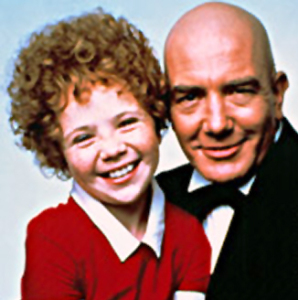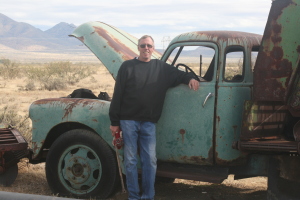Annie, the orphan of curly red-headed fame was a staple of my childhood years. The VHS tape of her singing about “Tomorrow!” was often played in our down time as children. In it, Annie and the other kids of the city orphanage are longin g for families and forced into fruitless hard labor by a nasty overseer, Ms Hannigan, who sloppily drinks gin in her bathtub. At the end, Daddy Warbucks steps in to love and care for Annie and all is well. (Or so I remember.)
g for families and forced into fruitless hard labor by a nasty overseer, Ms Hannigan, who sloppily drinks gin in her bathtub. At the end, Daddy Warbucks steps in to love and care for Annie and all is well. (Or so I remember.)
My father was not like Daddy Warbucks. Where Mr. Warbucks was gruff, polished, and wealthy, my dad, in his most natural element, is mellow, slightly scruffy, and deeply appreciative of simplicity. At the heart of who he is, my father values hard work. Once, I heard him praise a hired kid with these words, “Someone taught you how to work, son. Thanks for your hustle today.” Likewise, he taught me and my siblings to work. And still, in many ways, I am most at home working.
Mostly, I experienced the childhood tasks of family life with the wordless satisfaction of contributing, of doing what was expected of me. The wood pile grew as we added to it or shrunk as the pieces were carried into the house to be used in the woodstove.The flames in the rusty burn barrel or the plants that sprouted out the compost pile were things to watch and wonder about. Long sessions of grating cheese, placing it into ziploc bags to be frozen, or peeling apples, straight from the neighboring orchards, took place around the kitchen table. These were the normal activities of money-saving and country-living as far as I knew.
However, in one unfortunate incident of my childhood years, I was channeling my pre-teen Annie-angst about my “hard-knock life.” My father asked me a question, and I, filled with the injustice of having to wash the family dishes, muttered something snarky in response. I know it involved the dreadful command for him to “Shut up!” Whatever sarcasm and disrespect I mumbled over the sink of soapy water must have caught my gentle dad at the wrong moment. His anger had a momentary flare. Amplified words about gratitude and “how good I have it” filled the kitchen space as he pulled me away from the kitchen sink. A generally good kid that wanted to please, I flushed with shame.
Years later, again up to my elbows in soapy water, a mountain of dishes awaited attention. The movement of many women in a kitchen, which could have been disastrous, resembled well-moving traffic patterns. All around me, to and fro, women dealt with leftovers, scrapped excess into the trash, dried the now-hot items and put them back into their cabinet home.
I was now a live-in staff member for a home that welcomed women in crisis–community meals and hence, community dish-washing were a regular part of our life together. Many of these women had indeed had a “hard-knock life”–victims of others’ choices as well as their own; lives of poverty, trauma, and tremendous hardship. The women shared the common ground of being pregnant or having newborns. Their bellies, in various stages of soft roundness, gave witness to their motherhood. Their scars, tattoos, and biting humor gave witness to their past.
For the most part, dish-washing is the forgettable in-between activity of the more significant moments of meals and time spent together. But for my eyes, this task was a place of great beauty, the dance of a community that knew how to work together.
For me, it was a feeling of home, similar to that of my childhood years. But now, instead of moving under the protective gaze of my father, I was in the role of parent, teaching others to contribute to the wellbeing of our household, engaging everyone in money-saving tasks, and holding people accountable to inappropriate remarks.
With my mother at his side, my father had built my childhood home from his know-how, hard work, and long-suffering patience, slowly calling it into creation. I had built the home for women out of the bones of an old, abandoned property, straight from the sheer goodness of God and from hours and hours of gut-wrenching, sacrificial work. In physically building a place, it has a special hold on you. It helps me understand my father better.
Many of the women who I shared that kitchen with don’t have a father in their lives. Some never knew their father; others associate their father with the drugs and violence that he brought home. Many of those women grieve the fact that they will raise their children without a father. After years of hearing the stories of these women, it is painfully obvious that my father’s kitchen message was right. I have every reason to be grateful.
How good I had it.

Mary, I’m getting to this a couple days late, and it’s like you were a fly on my wall today! Trying to instill in your kids a work ethic, values around making a home together with family is so challenging! It’s funny (at times, when it’s not sanity-testing), as the dad now, to be on the other side of the issue with my two boys. Also, I lived at a Quaker contemplative retreat center for two years and can honestly say that being on dish duty in community with the other residents and guests was as powerful an experience as any contemplative exercise, experience in the natural setting, or course I took while I was living there. Really great stuff here…
Mary, I LOVE how this piece turned out. You’ve described things so beautifully—your father, the growing and shrinking of the woodpile, the women you washed dishes with in the community home. Thank you for sharing where you came from and how it has shaped who you are today.
This is special, Mary. I was captivated by your writing and flow.The story you have to tell in your own life is beautiful. Thank you for sharing this with us.
Oh my, how I enjoyed this piece. You captured the tension that most of us with loving fathers experience during our younger, “breaking away” years. As we grow and mature, we begin to recognize the importance of the people in our lives, like our fathers, who called us to gratitude. Your gratitude for having it good has fueled your work with the women who have truly had “hard knock lives.” Thank you for sharing your perspectives from the kitchen sink.